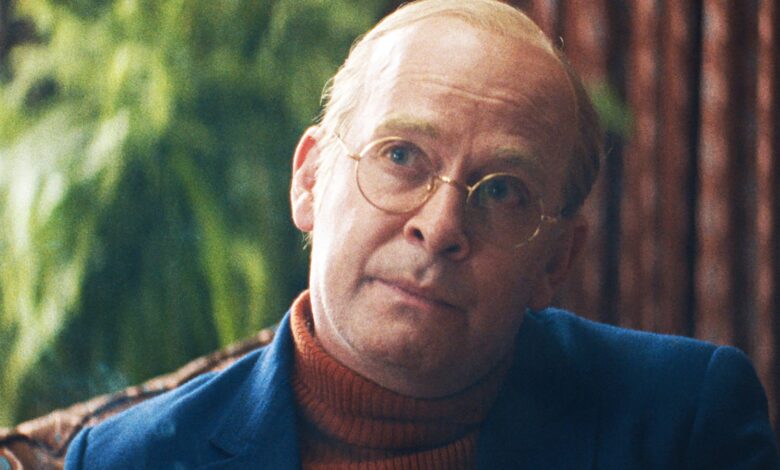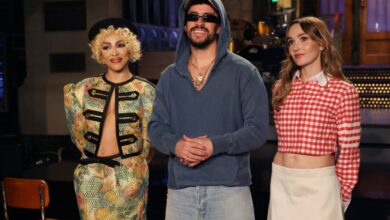Tom Hollander’s Latest ‘Failure’ Is Truman Capote

The British actor on mastering Capote’s “creaky” voice in Feud: Capote vs. The Swans and working with Mike White on The White Lotus
Tom Hollander didn’t get into showbiz to play himself. He played a bumbling MP in In the Loop, and a scheming socialite in The White Lotus. Most recently, he played the treasured author Truman Capote in FX’s Feud: Capote vs. The Swans, who slithers his way into high society New York, becoming a highly requested guest at dinner parties and resort getaways — only to have it all turn sour.
With the Hollywood magic stripped away, Hollander lives a reserved lifestyle. His home sits in the rural English countryside east of Oxfordshire, where he spends his time reading and brewing up recipes in the kitchen. He’s picked up cooking, adding that Capote also wore a chef’s hat at times, and says he whipped up a vegetable soup for lunch on Friday with parsnips, carrots, garlic, an English zucchini, and other ingredients he found at the bottom of his refrigerator.
“I spent a lot of years going out, dining out because of the lifestyle I was living in London,” Hollander tells Rolling Stone. “Previously mentioned, I’m now in the countryside, looking at the rain and the leaves in the mud and so, now there are different sorts of pleasures.”
Unlike the effervescent characters Hollanders recently embodied, he admits he’s generally an introvert.
“It makes me anxious these days,” he says. “I think it’s a young person’s game.”
Hollander, whose name is often confused with Spider-Man: No Way Home’s Tom Holland, says he’s attracted to the failure trope, and success stories without conflict bore him. The eight-part Ryan Murphy created-series Feud: Capote vs. The Swans documents Capote’s literary climb, his affiliation with a coterie of high society women he nicknames The Swans, and his abrupt decline following the publishing of Answered Prayers excerpt in Esquire, where he reveals the scandals and intimate secrets of his wealthy companions.
“As a performer, I think it’s more interesting to play if there’s pain in it,” Hollander says.
Editor’s picks
More than anything, Hollander applies childlike wonder, wit, and rigor into each role. Hollander spoke with Rolling Stone about mastering Capote’s squeak-like voice in Feud: Capote vs. The Swans and working beside Mike White in The White Lotus.
You’ve praised your dialect coach Jerome Butler for helping you achieve Capote’s squeak-like voice. What exercises did you do to get into character?
We broke him down, the character down, into about 20 little phrases which we picked out of early Truman and also late Truman because we needed him through time — which is covered pretty well in the Maysles documentary which is parodied in Episode Three. The real life documentary, we used as a touchstone of him as a younger, vital guy, and then we used older interview footage for him as the old drunk Truman.
At the beginning of each session, working on the actual script, Jerome would go, “Let’s do some touchdowns,” and then give me No. 5, and I’d give him No. 5. And he’d say, “What’s this aspect or what’s that aspect” and you get a little code together. You get a little language between the two of you. We’d talk about creaky voice, “remember creaky voice,” because we’ve identified there was a particular sound in his throat sometimes that if it wasn’t there, it sounded wrong. You get the pitch, but we also needed the constriction of what we called creaky voice.
The show has a rather lavish side to it. What’s your personal drinking and dining habits? Do you treat yourself to gourmet meals?
No. No. No. I love cooking. I do love cooking. I cook for myself. I love the ritual of preparing food — I don’t think I’m any good at it particularly — but I enjoy it enormously. It’s not fancy, it’s just the self sufficiency of being able to [cook].
Related
At the peak of Truman’s life, he indulges in exquisite meals at La Côte Basque with the Swans and lavish parties. We know that his death had to do with drug and alcohol abuse, but what do you think killed Truman’s creative fire?
You hear repeatedly from writers that writing is the loneliest job in the world, they all hate it. They hate the blank page. They hate the desk, the solitary desk. It’s a life of extraordinary discipline, which Capote talks about very eloquently. What makes it tragic, is that he knows better than anyone what he’s not doing and what he ought to be doing and what the booze is doing to him and what the pills are doing. He knows. That’s why it’s so sad. That’s often the case with addicts is that they know better than anyone how bad it is and what they’re doing to themselves.
What’s your relationship to alcohol or alcoholism?
I’ve been in the entertainment industry for 30 years, it’s everywhere. I’ve seen colleagues, and I’ve encountered that stuff repeatedly. Without going into any detail about it, it’s everywhere. Show business is a thrill seekers industry.
Something you’ve been quoted saying a couple of times is that you like playing failures. In Feud: Capote vs. The Swans, you play the author in his lowest moments. So what is it about failures that you’re so attracted to?
There’s something quite banal about everything going terribly well for somebody. To be a human being you have to taste failure and so it’s how people behave in response to that, isn’t it? Some people are crushed by it, some people heroically overcome it through love or through relationships with other people.
Quentin befriends Tanya (Jennifer Coolidge) in The White Lotus during his most desperate moments. Other than the iconic “These gays are trying to murder me” scene, how do you remember The White Lotus?
I remember tonally playing a game with [The White Lotus creator] Mike White. We were very consciously from one scene to the next making the audience wonder in terms of who Quentin was, or the life Quentin was living. It’s not that deep, as a performance. We’re not going too much into Quentin’s life or otherwise. He’s a glorious, glamorous figure who comes into a murder mystery and we’re not sure whether to love him or when he’s charismatic and lovely or whether he’s a villain. It was about calibrating that tension. Making him seem suspicious enough, but also nice enough.
This is not the first queer character you’ve played. How you respond to the argument that queer characters should be played by queer people?
Those arguments are all completely valid. It boils down to what the people casting the part want. So, if people asked me to play the character, and I think I can do a good job, and they’re serious about it, then why wouldn’t I? Then the two instances that we’re talking about, I’m cast by Mike White who is a gay man. It’s his choice. If he’s happy, then I’m happy. Similarly, Ryan Murphy is an extremely important cultural figure in terms of championing voices that have not been heard enough. He’s a dynamic figure in that regard. If he thinks I’m the guy to play this character, then I’m happy to do that. And my job is to inhabit the whole person. The whole character, not merely the sexuality of the character. That’s one aspect.
Back in 2009, you starred as Simon Foster in In The Loop, and worked alongside Jesse Armstrong before his Succession success. What was it like working with him in the political satire?
In the Loop, that was an amazing experience. Jesse was their main writer, but it was a team of writers as well. There were Simon Blackwell, a whole bunch of them, and Armando Iannucci crucially, who directed it and is a writer himself and controlled the writing room for that. There was a whole bunch of them throwing in different lines. That was the first sort of semi-improvised thing that I’d done. That working process is very interesting, and I think Jesse went on and used it in Succession to an extent.
Trending
I think it’s fair to say that you’ve played characters that are almost effortlessly funny, even if they’re not trying to be.
You’re laughing at him. He is a fool.
Capote has some laughable one-liners himself. Anything else you’d like to say as your turn as the deeply admired, yet troubled writer?
I would say that I’ve always loved America, and playing Truman was like the most elevated form of tourism. You learn about that country through playing a character that is important in the life of that country, and that’s an amazing thing.


